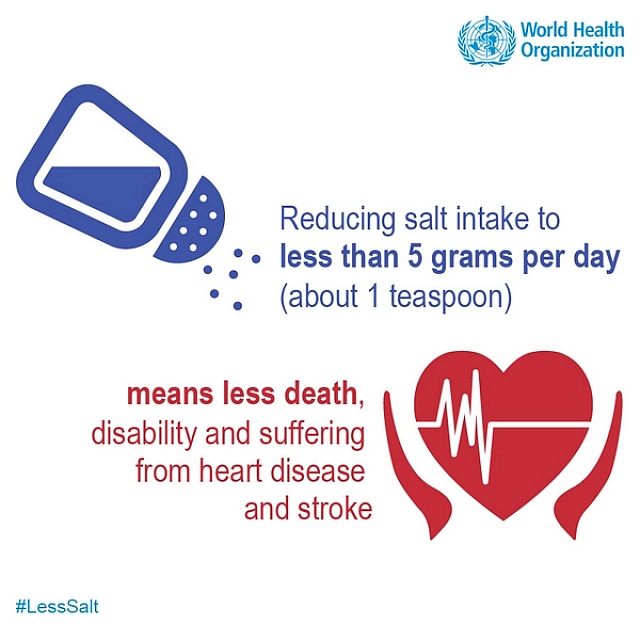Eating healthy: Reduce salt intake
 The World Health Organization (WHO) commemorates World Salt Awareness Week from 16 to 22 March, 2015 under the theme ‘less salt please’. This year’s theme highlights the importance of eating out healthy.
The World Health Organization (WHO) commemorates World Salt Awareness Week from 16 to 22 March, 2015 under the theme ‘less salt please’. This year’s theme highlights the importance of eating out healthy.
Most people consume too much salt without even realizing it. In many African countries, the main sources are salt condiments and processed foods. Salt can also be found in other forms and the source depends on the cultural context and dietary habits of the population. Excess consumption of salt is closely associated to high blood pressure, an increased risk of heart disease and stroke.
The global prevalence of raised blood pressure in adults aged 18 years and over was around 22% in 2014. An estimated 2.5 million global deaths could be prevented each year if salt consumption were reduced to the WHO recommended level of under 5 grams per day. Current estimates suggest that the global intake of salt is about double this recommended level.
“Strong evidence suggests that salt is closely related to high blood pressure and reducing salt intake has been identified as one of the most cost-effective measures to improve overall health in resource-poor settings,” said Dr Tigest Ketsela, Director of Health Promotion at the WHO Regional Office for Africa.
High blood pressure is a condition in which the blood vessels have persistently raised pressure. Often, people in low- and middle-income countries do not have access to health programmes that provide prevention, early detection and treatment of high blood pressure or its devastating consequences.
As a result, many people are diagnosed late in the course of the disease and die from cardiovascular diseases and other noncommunicable diseases (NCDs). In countries of the African Region, people often die from NCDs in their most productive years resulting in negative impact on social and economic developments.
WHO recommends a reduction in salt intake to less than 5 grams per day (sodium 2 g/day) to reduce blood pressure and the risk of coronary heart disease and stroke. For children, the recommended maximum level of intake of 2 g/day of sodium for adults should be adjusted downwards on the basis of the energy requirements of children relative to those of adults.
Eating patterns are also changing in the African Region to less fruits, vegetables, and dietary fibre that are key components of a healthy diet. Fruits and vegetables contain potassium which is known to counter the negative effects of salt and contributes to reduced blood pressure.
Improving dietary habits is a societal as well as an individual responsibility. In 2013, the World Health Assembly, the decision-making body of WHO agreed to nine global voluntary targets for the prevention and control of NCDs, which included a 30% relative reduction in the intake of salt by 2025.
WHO will continue to support countries in the African Region to implement a population-based, multisectoral, and culturally relevant approach to reduce salt consumption. Key strategies include:
- creating enabling environments for salt reduction through local policy interventions;
- the promotion of “healthy food” settings in restaurants, schools, workplaces, communities and cities; and
- increasing consumer awareness and empowerment of populations to reduce salt intake.
____________________________________________
For more information, please contact:
Technical contact:
Dr Davison Munodawafa; Tel: +472 413 9476; Email: munodawafad [at] who.int (munodawafad[at]who[dot]int)
Media contacts:
Dr Cory Couillard; Tel: + 472 413 9995; Email: couillardc [at] who.int (couillardc[at]who[dot]int)
Mr Collins Boakye-Agyemang; Tel: + 472 413 9420; Email: boakyeagyemangc [at] who.int (boakyeagyemangc[at]who[dot]int)


